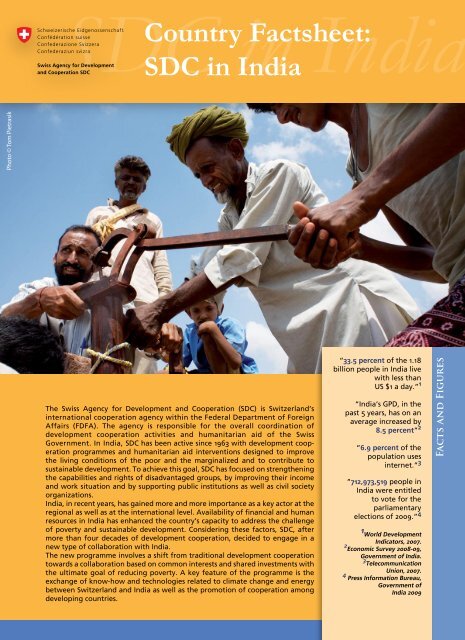Country Factsheet: SDC in India
Country Factsheet: SDC in India
Country Factsheet: SDC in India
Create successful ePaper yourself
Turn your PDF publications into a flip-book with our unique Google optimized e-Paper software.
<strong>in</strong> <strong>India</strong><br />
<strong>Country</strong> <strong>Factsheet</strong>:<br />
<strong>SDC</strong> <strong>in</strong> <strong>India</strong><br />
Photo © Tom Pietrasik<br />
The Swiss Agency for Development and Cooperation (<strong>SDC</strong>) is Switzerland’s<br />
<strong>in</strong>ternational cooperation agency with<strong>in</strong> the Federal Department of Foreign<br />
Affairs (FDFA). The agency is responsible for the overall coord<strong>in</strong>ation of<br />
development cooperation activities and humanitarian aid of the Swiss<br />
Government. In <strong>India</strong>, <strong>SDC</strong> has been active s<strong>in</strong>ce 1963 with development cooperation<br />
programmes and humanitarian aid <strong>in</strong>terventions designed to improve<br />
the liv<strong>in</strong>g conditions of the poor and the marg<strong>in</strong>alized and to contribute to<br />
susta<strong>in</strong>able development. To achieve this goal, <strong>SDC</strong> has focused on strengthen<strong>in</strong>g<br />
the capabilities and rights of disadvantaged groups, by improv<strong>in</strong>g their <strong>in</strong>come<br />
and work situation and by support<strong>in</strong>g public <strong>in</strong>stitutions as well as civil society<br />
organizations.<br />
<strong>India</strong>, <strong>in</strong> recent years, has ga<strong>in</strong>ed more and more importance as a key actor at the<br />
regional as well as at the <strong>in</strong>ternational level. Availability of f<strong>in</strong>ancial and human<br />
resources <strong>in</strong> <strong>India</strong> has enhanced the country’s capacity to address the challenge<br />
of poverty and susta<strong>in</strong>able development. Consider<strong>in</strong>g these factors, <strong>SDC</strong>, after<br />
more than four decades of development cooperation, decided to engage <strong>in</strong> a<br />
new type of collaboration with <strong>India</strong>.<br />
The new programme <strong>in</strong>volves a shift from traditional development cooperation<br />
towards a collaboration based on common <strong>in</strong>terests and shared <strong>in</strong>vestments with<br />
the ultimate goal of reduc<strong>in</strong>g poverty. A key feature of the programme is the<br />
exchange of know-how and technologies related to climate change and energy<br />
between Switzerland and <strong>India</strong> as well as the promotion of cooperation among<br />
develop<strong>in</strong>g countries.<br />
“33.5 percent of the 1.18<br />
billion people <strong>in</strong> <strong>India</strong> live<br />
with less than<br />
US $1 a day.” 1<br />
“<strong>India</strong>’s GPD, <strong>in</strong> the<br />
past 5 years, has on an<br />
average <strong>in</strong>creased by<br />
8.5 percent” 2<br />
“6.9 percent of the<br />
population uses<br />
<strong>in</strong>ternet.” 3<br />
“712,973,519 people <strong>in</strong><br />
<strong>India</strong> were entitled<br />
to vote for the<br />
parliamentary<br />
elections of 2009.” 4<br />
1 World Development<br />
Indicators, 2007.<br />
2 Economic Survey 2008-09,<br />
Government of <strong>India</strong>.<br />
3 Telecommunication<br />
Union, 2007.<br />
4 Press Information Bureau,<br />
Government of<br />
<strong>India</strong> 2009<br />
Facts and Figures
Areas of cooperation<br />
Photo © Richard Gerster<br />
• Climate change constitutes the ma<strong>in</strong> focus area<br />
of the cooperation supported by <strong>SDC</strong> <strong>in</strong> <strong>India</strong>.<br />
It primarily <strong>in</strong>cludes <strong>in</strong>novative programmes<br />
with a l<strong>in</strong>k to national, regional and global<br />
policy dialogue. The programmes are designed<br />
to support efforts towards adaptation to the<br />
effects of a chang<strong>in</strong>g climate situation as well<br />
as towards mitigation of the causes of climate<br />
change by promot<strong>in</strong>g renewable energy and<br />
energy efficiency measures. <strong>SDC</strong> furthermore<br />
supports programmes at the <strong>in</strong>terface between<br />
climate change, food security, and disaster risk<br />
reduction.<br />
• The regional programme on decentralisation<br />
and local governance <strong>in</strong> South Asia is located<br />
<strong>in</strong> <strong>India</strong>. <strong>SDC</strong> hosts a regional hub <strong>in</strong> Delhi to<br />
promote exchanges of experiences, lessons<br />
learnt and relevant practices relat<strong>in</strong>g to<br />
decentralisation across South Asian countries,<br />
as well as between Switzerland and <strong>India</strong>.<br />
• In the area of South-South cooperation,<br />
knowledge shar<strong>in</strong>g and network<strong>in</strong>g, <strong>SDC</strong> is<br />
committed to build knowledge management<br />
tools and to strengthen platforms <strong>in</strong>clud<strong>in</strong>g<br />
cooperation between develop<strong>in</strong>g countries <strong>in</strong><br />
all the programmes it supports.<br />
Where <strong>SDC</strong> works<br />
<strong>SDC</strong> supports programmes<br />
<strong>in</strong> many parts of <strong>India</strong>,<br />
with a focus on arid and<br />
semi-arid areas as well as on the<br />
Himalayas.<br />
Overall budget<br />
The <strong>SDC</strong> budget for <strong>India</strong> is on an<br />
average 8 million Swiss Francs or 350<br />
million <strong>India</strong>n Rupees per year.<br />
Partners<br />
Public sector entities such as<br />
government departments; Academic<br />
and research <strong>in</strong>stitutions; Civil<br />
society organizations and advocacy<br />
groups; Relevant private enterprises<br />
<strong>in</strong> the context of multi-stakeholder<br />
partnership; Professional associations<br />
and other development actors.
Programme <strong>in</strong> detail<br />
Photo © Tom Pietrasik/UNDP<br />
CA<br />
Climate Change: Adaptation<br />
Constitut<strong>in</strong>g one of the ma<strong>in</strong> focus area of the<br />
cooperation, <strong>SDC</strong>’s adaptation programme is<br />
designed to strengthen the ability of the most<br />
vulnerable communities to cope with the expected<br />
and actual impacts of climate change. Together<br />
with the Government of <strong>India</strong>, <strong>SDC</strong> works towards<br />
<strong>in</strong>creas<strong>in</strong>g the communities’ adaptive capacities.<br />
<strong>SDC</strong> with its long-stand<strong>in</strong>g experience <strong>in</strong> <strong>India</strong><br />
recognizes the need to <strong>in</strong>tegrate the concept of<br />
climate change management <strong>in</strong>to all development<br />
programmes, as the consequences of global<br />
warm<strong>in</strong>g also have an impact on the efficiency<br />
of projects. Throughout, the focus has to rema<strong>in</strong><br />
on support<strong>in</strong>g the most vulnerable and the poor<br />
and on improv<strong>in</strong>g their lives. <strong>SDC</strong>’s adaptation<br />
<strong>in</strong>itiatives therefore look at water resources, food<br />
security, and agricultural biodiversity, <strong>in</strong>clud<strong>in</strong>g<br />
the promotion of climate resilient and climate<br />
ready crops, which are drought, salt and pest<br />
resistant. The exchange of experiences gathered<br />
and lessons learnt is equally essential and <strong>in</strong> the<br />
long run <strong>in</strong>fluences the ref<strong>in</strong><strong>in</strong>g of exist<strong>in</strong>g and<br />
the design of new policies on climate change not<br />
only <strong>in</strong> <strong>India</strong>, but also at the <strong>in</strong>ternational level.<br />
DR<br />
Disaster Risk Reduction<br />
Nearly 700 million people <strong>in</strong> rural <strong>India</strong> depend<br />
on agriculture, fisheries and forestry for their<br />
livelihoods, all of which are highly susceptible<br />
sectors to climate change. The consequences of<br />
global warm<strong>in</strong>g affect lives, especially those of<br />
the poor and marg<strong>in</strong>alized who suffer the most<br />
from land degradation, water scarcity and natural<br />
disasters. Over the past decade, <strong>SDC</strong> has played<br />
an important role <strong>in</strong> relief and reconstruction<br />
efforts <strong>in</strong> several disasters. <strong>SDC</strong><br />
supported local communities<br />
and authorities after the<br />
Orissa cyclone <strong>in</strong> 1999, the<br />
Gujarat earthquake <strong>in</strong> 2001,<br />
and the tsunami <strong>in</strong> 2004.<br />
With this experience and<br />
know-how, <strong>SDC</strong>’s disaster<br />
risk reduction strategy over<br />
the next few years aims at<br />
m<strong>in</strong>imiz<strong>in</strong>g the losses <strong>in</strong> lives<br />
and assets as a consequence<br />
of natural disasters. <strong>SDC</strong> will<br />
therefore contribute to build<br />
the capacities of the people<br />
to tackle possible disasters <strong>in</strong><br />
a systematic and coord<strong>in</strong>ated<br />
manner. <strong>SDC</strong> prioritizes action<br />
and practical means to achieve<br />
disaster resilience <strong>in</strong> vulnerable<br />
communities.<br />
Photo © Benoit Marquet/UNDP<br />
CE<br />
Climate Change: Energy Efficiency<br />
and Renewable Energy<br />
<strong>SDC</strong> supports programmes that work towards mitigation of the causes of climate<br />
change by promot<strong>in</strong>g renewable energy and energy efficiency measures. S<strong>in</strong>ce 1992<br />
<strong>SDC</strong> has been work<strong>in</strong>g cont<strong>in</strong>uously <strong>in</strong> the energy and environment sector. The current<br />
energy programme of <strong>SDC</strong> benefits from this longstand<strong>in</strong>g experience and aims at<br />
implement<strong>in</strong>g m<strong>in</strong>imum energy efficiency standards for the design and construction<br />
of new build<strong>in</strong>gs for commercial use, as well as adopt<strong>in</strong>g energy efficiency <strong>in</strong> micro,<br />
small, and medium enterprises. After successful implementation, these technologies<br />
would be replicated <strong>in</strong> select areas across <strong>India</strong>. <strong>SDC</strong> also looks at social and health<br />
issues of employees and workers of these enterprises and supports their <strong>in</strong>itiatives<br />
to improve their and their families work<strong>in</strong>g and liv<strong>in</strong>g conditions. To ensure better<br />
access to electricity for the rural poor, <strong>SDC</strong> <strong>in</strong> <strong>India</strong> also supports <strong>in</strong>itiatives to locally<br />
generate energy from renewable sources, and to enhance at the same time the<br />
capacity of the local population and local authorities to manage the new technologies.<br />
In addition, <strong>SDC</strong> strives to establish platforms to share methods of efficient energy<br />
use and collaborate with different stakeholders to exchange knowledge and f<strong>in</strong>d<br />
solutions that can be shared across different regions and countries.<br />
Photo © TERI
Cross-cutt<strong>in</strong>g themes<br />
Photo © Lisa Magnollay<br />
DC<br />
Decentralisation and<br />
Local Governance<br />
In <strong>India</strong>, the 73rd and 74th Constitutional<br />
Amendments of 1993 <strong>in</strong>stitutionalized<br />
the process of decentralisation which had<br />
the effect of transform<strong>in</strong>g the Panchayats<br />
- local government bodies - <strong>in</strong>to key<br />
<strong>in</strong>stitutions of local self-governance.<br />
S<strong>in</strong>ce then, most states have undertaken<br />
a systematic and endur<strong>in</strong>g effort to<br />
implement an operative vision of the<br />
Panchayati Raj. The goal is to ensure<br />
the <strong>in</strong>stitutionalisation of participatory<br />
democracy at the local level. Fortify<strong>in</strong>g<br />
these decentralisation efforts has been<br />
one of the pillars of <strong>SDC</strong>’s work <strong>in</strong><br />
<strong>India</strong>. <strong>SDC</strong>s decentralisation programme<br />
promotes accountable, transparent and<br />
<strong>in</strong>clusive governance at the district and<br />
community levels. This allows for greater<br />
<strong>in</strong>volvement of the citizens, especially<br />
the economically weak and socially<br />
marg<strong>in</strong>alized. Additionally, <strong>SDC</strong> looks<br />
at enabl<strong>in</strong>g people to access resources<br />
to design, plan, and implement activities<br />
accord<strong>in</strong>g to local needs and demands<br />
of the poor. <strong>SDC</strong> furthermore promotes<br />
exchanges of experiences, lessons<br />
learnt and relevant practices relat<strong>in</strong>g<br />
to decentralisation across South Asian<br />
countries, as well as between Switzerland<br />
and <strong>India</strong>.<br />
Contact details<br />
Swiss Agency for Development and<br />
Cooperation <strong>SDC</strong><br />
Swiss Cooperation Office,<br />
Embassy of Switzerland,<br />
Chandragupta Marg, Chanakyapuri,<br />
New Delhi 110021, <strong>India</strong>.<br />
Phone: + 91 11 268 77819<br />
Fax: + 91 11 268 73631<br />
E-mail: delhi@sdc.net<br />
Website: www.sdc<strong>in</strong>dia.<strong>in</strong><br />
GG<br />
Governance and Gender<br />
Good governance forms the basis of susta<strong>in</strong>able<br />
economic and social development, which l<strong>in</strong>ks with<br />
<strong>SDC</strong>’s mandate to promote equitable, <strong>in</strong>clusive and<br />
susta<strong>in</strong>able development. This mandate makes<br />
it crucial for all programmes to address equality<br />
and improve participation of the poor and the<br />
marg<strong>in</strong>alized. <strong>SDC</strong> implements governance as a<br />
cross-cutt<strong>in</strong>g theme <strong>in</strong> all its projects, and bases<br />
its approach on three pr<strong>in</strong>ciples. One is that all<br />
stakeholders have to be accountable to ensure<br />
that all programmes of <strong>SDC</strong> have an impact on the<br />
lives of poor and disadvantaged communities. The<br />
second pr<strong>in</strong>ciple is <strong>in</strong>clusive participation, and looks<br />
at support<strong>in</strong>g and promot<strong>in</strong>g processes that enable<br />
groups concerned to articulate their needs and<br />
represent their <strong>in</strong>terests and rights at the national<br />
and <strong>in</strong>ternational level by encourag<strong>in</strong>g them to<br />
participate <strong>in</strong> important forums and multiple<br />
stakeholder consultations. The third pr<strong>in</strong>ciple, gender<br />
equality, ensures that concerns of women and<br />
men are taken <strong>in</strong>to consideration and that they<br />
are empowered to participate <strong>in</strong> development and<br />
decision mak<strong>in</strong>g processes.<br />
KM<br />
Knowledge Management and<br />
South-South Cooperation<br />
In all its programmes, <strong>SDC</strong> promotes knowledge<br />
management with a view to facilitate the generation,<br />
access, and exchange of knowledge among<br />
various stakeholders on development relevant<br />
issues, and to encourage critical debate, <strong>in</strong> <strong>India</strong><br />
as well as at regional and <strong>in</strong>ternational level. <strong>SDC</strong><br />
seeks to manage knowledge, share experiences<br />
and learn from them. This can take place by us<strong>in</strong>g<br />
different platforms such as conferences, sem<strong>in</strong>ars,<br />
meet<strong>in</strong>gs or websites. Direct <strong>in</strong>teractions among<br />
decision makers at the policy level, civil societies,<br />
affected communities, academic and research<br />
<strong>in</strong>stitutions <strong>in</strong> <strong>India</strong> as well as <strong>in</strong> Switzerland are<br />
equally essential and supported. Furthermore <strong>SDC</strong><br />
looks at br<strong>in</strong>g<strong>in</strong>g field expertise to the policy level,<br />
and promotes understand<strong>in</strong>g of policies at the field<br />
level. Reciprocal knowledge shar<strong>in</strong>g, dialogue as<br />
well as transfers of technologies among develop<strong>in</strong>g<br />
countries are crucial to further equitable and<br />
susta<strong>in</strong>able development processes and are actively<br />
supported by <strong>SDC</strong>.

















